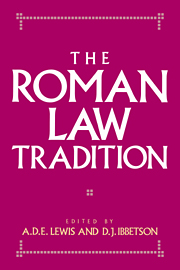Book contents
- Frontmatter
- Contents
- List of contributors
- Foreword: Peter Stein, Regius Professor of Civil Law in the University of Cambridge, 1968–1993
- List of abbreviations
- 1 The Roman law tradition
- 2 Labeo and the fraudulent slave
- 3 Doing and causing to be done
- 4 The danger of definition: contrectatio and appropriation
- 5 Going to the fair – Jacques de Révigny on possession
- 6 Bembo giureconsulto?
- 7 Gentilis and the interpretatio duplex
- 8 Ius gentium in the practice of the Court of Admiralty around 1600
- 9 Stair's title ‘Of Liberty and Servitude’
- 10 The actio communi dividundo in Roman and Scots law
- 11 Sale and transfer of title in Roman and Scots law
- 12 ‘What Marcellus says is against you’: Roman law and Common law
- 13 Audi et alteram partem: a limit to judicial activity
- Index of sources
- Index of names and subjects
4 - The danger of definition: contrectatio and appropriation
Published online by Cambridge University Press: 08 October 2009
- Frontmatter
- Contents
- List of contributors
- Foreword: Peter Stein, Regius Professor of Civil Law in the University of Cambridge, 1968–1993
- List of abbreviations
- 1 The Roman law tradition
- 2 Labeo and the fraudulent slave
- 3 Doing and causing to be done
- 4 The danger of definition: contrectatio and appropriation
- 5 Going to the fair – Jacques de Révigny on possession
- 6 Bembo giureconsulto?
- 7 Gentilis and the interpretatio duplex
- 8 Ius gentium in the practice of the Court of Admiralty around 1600
- 9 Stair's title ‘Of Liberty and Servitude’
- 10 The actio communi dividundo in Roman and Scots law
- 11 Sale and transfer of title in Roman and Scots law
- 12 ‘What Marcellus says is against you’: Roman law and Common law
- 13 Audi et alteram partem: a limit to judicial activity
- Index of sources
- Index of names and subjects
Summary
A recurrent subject of Peter Stein's writings has been the development of legal reasoning from the Roman world to the modern. This paper, offered as a mark of gratitude and respect to a teacher who led many a fledgeling law student on the path towards an understanding of what legal thinking is about, takes as its subject one of the problems of definition in law, the tension set up when the legal definition of an institution gets too far removed from its popular conception. ‘Omnis definitio in iure civili periculosa est; parum est enim ut non subverti potest.’ Nowhere is this warning more necessary than in the law of wrongs, whether it be the Romans' law of delict or the English law of crimes, for it is here that the legal definition is most strongly (and continually) brought up against the popular perception of wrongful conduct.
Sometimes the problem is simply one of language. The legal definition of rape in English law, for example, is non-consensual intercourse with a woman by a man who knows that there is a risk that she may not be consenting or who is indifferent to whether or not she is consenting; English language, though, has no word in common usage to denote non-consensual sexual intercourse in circumstances where the man did genuinely believe that the woman was consenting. In popular parlance such a situation is rape; in law it is not.
- Type
- Chapter
- Information
- The Roman Law Tradition , pp. 54 - 72Publisher: Cambridge University PressPrint publication year: 1994
- 1
- Cited by

